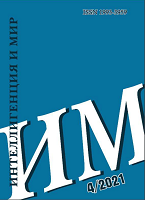Место интеллигенции в реализации национальной политики Cоветской власти в БССР (1950-1980 гг.)
The place of the intelligentsia in the implementation of the national policy of the Soviet government in the BSSR (1950-1980)
Author(s): A. A. Fedotov, V. V. TerentyevSubject(s): Cultural history, Eastern Slavic Languages, Culture and social structure , Post-War period (1950 - 1989), Politics and Identity
Published by: Ивановский государственный университет
Keywords: intelligentsia; cultural exchange; interpenetration of cultures; language; national question; BSSR; Belarus;
Summary/Abstract: The article focuses on the question of how the use of Russian as the language of interethnic communication in the USSR was substantiated by representatives of the Soviet intelligentsia, in particular, what they saw as its difference in this quality from the use of the Russian language as a world language. The article shows the involvement of the creative intelligentsia in the implementation of the Soviet national policy in the BSSR; the perpetuation of the memory of the intelligentsia by the Soviet authorities. To solve the tasks, the materials of the Soviet scientific and periodical press, the state archive of the Vitebsk region were studied. Representatives of the intelligentsia were widely involved by the Soviet and party bodies in the implementation of national policy in the BSSR and in other union republics. In their creative and scientific activities, representatives of the intelligentsia could count on substantial state support, but only if their work was "in line" with what was necessary for the Soviet state at this historical stage. But even within a limited framework, the results achieved were impressive. The importance of the Russian language, not only as a language of interethnic communication in the USSR, but also as a world language, steadily grew; the broad involvement of the intelligentsia in the implementation of Soviet national policy contributed to the establishment of cultural exchange not only between different regions of different Soviet republics, but also between different regions of the socialist camp countries. The perpetuation of the memory of historical figures — representatives of the intelligentsia by the party and Soviet bodies was one of the ways to include the intelligentsia in the general cultural and semantic space of the Soviet Union. Much of the positive experience of that time can be in demand in modern conditions.
Journal: Интеллигенция и мир
- Issue Year: 2021
- Issue No: 4
- Page Range: 35-48
- Page Count: 14
- Language: Russian

